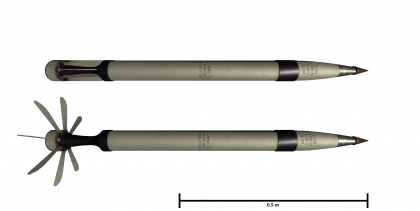Difference between revisions of "S-5M"
Colok76286 (talk | contribs) (Edits) |
Colok76286 (talk | contribs) (Edits) |
||
| Line 39: | Line 39: | ||
== History == | == History == | ||
| − | <!-- ''Examine the history of the creation and combat usage of the weapon in more detail than in the introduction. If the historical reference turns out to be too long, take it to a separate article, taking a link to the article about the weapon and adding a block "/History" (example: <nowiki>https://wiki.warthunder.com/(Weapon-name)/History</nowiki>) and add a link to it here using the <code>main</code> template. Be sure to reference text and sources by using <code><nowiki><ref></ref></nowiki></code>, as well as adding them at the end of the article with <code><nowiki><references /></nowiki></code>.'' --> | + | <!-- ''Examine the history of the creation and combat usage of the weapon in more detail than in the introduction. If the historical reference turns out to be too long, take it to a separate article, taking a link to the article about the weapon and adding a block "/ History" (example: <nowiki>https://wiki.warthunder.com/(Weapon-name)/History</nowiki>) and add a link to it here using the <code>main</code> template. Be sure to reference text and sources by using <code><nowiki><ref></ref></nowiki></code>, as well as adding them at the end of the article with <code><nowiki><references /></nowiki></code>.'' --> |
As a whole, the S-5 rockets were developed after the capture of German 55 mm R4M rockets. Development began in 1951 as project ARS-57, in 1955 the project reached completion and received the S-5 designation. The S-5 family contains roughly 18 variants. While the S-5 has seen extensive use, it is known for its poor accuracy. During the Soviet invasion of Afghanistan the S-5 were deemed ineffective and were phased out for the larger S-8 rockets. | As a whole, the S-5 rockets were developed after the capture of German 55 mm R4M rockets. Development began in 1951 as project ARS-57, in 1955 the project reached completion and received the S-5 designation. The S-5 family contains roughly 18 variants. While the S-5 has seen extensive use, it is known for its poor accuracy. During the Soviet invasion of Afghanistan the S-5 were deemed ineffective and were phased out for the larger S-8 rockets. | ||
== Media == | == Media == | ||
| − | '' | + | ''Excellent additions to the article would be video guides, screenshots from the game, and photos.'' |
== See also == | == See also == | ||
Revision as of 12:16, 24 June 2022
Contents
Description
The S-5M is a 57 mm unguided rocket. This is a modernized version of the S-5, it contains an HE-FRAG warhead designed to attack bombers and unarmoured targets.
Vehicles equipped with this weapon
General info
Tell us about the tactical and technical characteristics of the rocket.
Effective damage
Describe the type of damage produced by this type of rocket (high explosive, splash damage, etc)
Comparison with analogues
Give a comparative description of rockets that have firepower equal to this weapon.
Usage in battles
Describe situations when you would utilise this rocket in-game (vehicle, pillbox, base, etc)
Pros and cons
Summarise and briefly evaluate the weaponry in terms of its characteristics and combat effectiveness. Mark pros and cons as a list.
Pros:
Cons:
History
As a whole, the S-5 rockets were developed after the capture of German 55 mm R4M rockets. Development began in 1951 as project ARS-57, in 1955 the project reached completion and received the S-5 designation. The S-5 family contains roughly 18 variants. While the S-5 has seen extensive use, it is known for its poor accuracy. During the Soviet invasion of Afghanistan the S-5 were deemed ineffective and were phased out for the larger S-8 rockets.
Media
Excellent additions to the article would be video guides, screenshots from the game, and photos.
See also
Links to the articles on the War Thunder Wiki that you think will be useful for the reader, for example:
- reference to the article about the variant of the weapon;
- references to approximate analogues by other nations and research trees.
External links




